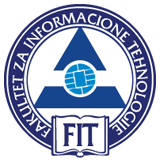Study program: Information technology
Specialist studies at FIT are interdisciplinary and enable acquiring advanced knowledge in the field of Software Engineering, Computer Networks and Telecommunications and Information Systems. Students gain an academic title with the possibility of practical work in a real environment and real problems. Particular emphasis is on the development and acquisition of skills for innovation and the practical application of acquired theoretical knowledge, which enables postgraduates to successfully solve problems in practice.
In the first semester students opt for one of the compulsory subjects (Advanced Networking or Administration of Computer Networks) depending on the directions that have been completed in basic studies and general knowledge in the field of computer networks
Duration: 1 year - 60 ECTS
Title: Information Technology Specialist
I SEMESTER
| Course | Project Management | ||||
| Study program | Specialist studies: Information technology | ||||
| Status | Obligatory | Semester | Winter(VII) | ECTS/CSPK | 6 |
| Description | The aim of studying project management curs is to familiarize with the basic theoretical elements of the general concept of project management and the possibilities of applying the appropriate organizational and management methods and techniques of this concept. | ||||
| Preconditions | No preconditions | ||||
| Teaching methods | Lectures, exercises and work on the project. | ||||
| Course | The Methodology of Scientific Research | ||||
| Study program | Specialist studies: Information technology | ||||
| Status | Obligatory | Semester | Winter(VII) | ECTS/CSPK | 3 |
| Description | The objective of the course is to provide the necessary knowledge to enable students to use databases, research methods and other techniques in the process of scientific research. As a part of the course certain types of scientific research will be discussed in details, and their features explained. | ||||
| Preconditions | No preconditions | ||||
| Teaching methods | Lectures, exercises, case studies, seminar papers, colloquiums and final exams. Consultations | ||||
| Course | Analiza i specifikacija zahtjeva (obavezni) | ||||
| Study program | Specialist studies: Information technologies | ||||
| Status | Obligatory | Semester | Winter(VII) | ECTS/CSPK | 7 |
| Description | Students will learn how to capture software requirements and handle difficult situations in gathering data to build software systems. Special emphasis is given to working with clients and to learning about the needs of users who interact with a system. The course addresses elicitation, specification, and management of software system requirements. Additionally, the course examines iterative prototyping user interactions for a system. | ||||
| Preconditions | There are no formal prerequisites, but in order to successfully follow lectures and master the field, students need a basic knowledge of Software and Information Systems Design. | ||||
| Teaching methods | This course will include lectures, practical exercises, in-class discussions, case studies, presentations, guest speakers, individual student research and short presentation, and a final group project presentation. Use of the Moodle Learning platform to further support communication, by posting lecture notes, assignment instruction, timely announcements, and online quizzes or submission of assignments. | ||||
| Course | Administration of computer networks | ||||
| Study program | Specialist studies: Information technology | ||||
| Status | Obligatory | Semester | Winter(VII) | ECTS/CSPK | 7 |
| Description | The focus is on introducing the basic rules and procedures when administering computer networks. The course addresses the basic properties of computer networks regardless of their size. The goal of the course is to acquire theoretical and practical knowledge necessary for administering computer networks. Through the examples from practice, students will learn how to administer computer network and set network devices parameters. Upon completion of the course, students will be able to independently apply acquired knowledge to the design and configuration of computer networks. | ||||
| Preconditions | No preconditions | ||||
| Teaching methods | Lectures, seminars, labs, colloquiums and final exam. Consultations | ||||
| Course | Advanced Networking | ||||
| Study program | Specialist studies: Information technology | ||||
| Status | Obligatory | Semester | Winter(VII) | ECTS/CSPK | 6 |
| Description | The objective of the course is to introduce students to the advanced technologies in the field of telecommunications and computer networks, as well as their training in designing and administering computer networks. | ||||
| Preconditions | Computer Networks Fundamentals | ||||
| Teaching methods | Lectures, exercises, case studies, seminar papers, colloquiums and final exams. Consultations. | ||||
| Course | Advanced database systems | ||||
| Study program | Specialist studies: Information technology | ||||
| Status | Elective | Semester | Winter(VII) | ECTS/CSPK | 6 |
| Description | The objective of the course is to familiarize students with procedural programming over databases and to present possibilities of using PLSQL. | ||||
| Preconditions | No preconditions | ||||
| Teaching methods | Lectures, exercises and work on the project. | ||||
* Students in the first semester choose one of the compulsory subjects (Advanced Networking or Computer Network Administration), depending on the directions that have been completed in basic studies and the scope of prior knowledge in the field of computer networks.
II SEMESTER
| Course | Project | ||||
| Study program | Academic studies: Information systems | ||||
| Status | Obligatory | Semester | Summer(VIII) | ECTS/CSPK | 8 |
| Description | The student, in cooperation with the professor who is the mentor in the design of the project, identifies the problem from the practice in the field of information and communication technologies which can be solved using the acquired knowledge in basic studies. The student's independent work on the project development demonstrates the practical application of knowledge and develops / implements a solution that provides a quantitative and qualitative assessment of the overall knowledge acquired in the field of ICT with special qualifications in the field of information (information systems, computer networks, software engineering) | ||||
| Preresquisites | No prerequisites. | ||||
| Teaching methods | Consultations | ||||
ELECTIVE COURSES
INFORMATION SYSTEMS
| Course | Audit of Information Systems | ||||
| Study program | Specialist studies: Information technology | ||||
| Status | Elective | Semester | Summer(VIII) | ECTS/CSPK | 6 |
| Description | Acquiring knowledge in the field of information system audit. Students will be introduced to the process of creating control structure defined with a specific goal, audit of information technologies infrastructure in relation to it and setting the relevant procedure due to any inadequacy. | ||||
| Preconditions | No prerequisites | ||||
| Teaching methods | Teaching is performed through lectures, discussions with application of multimedia content and application of methods for distance education. Practical classes include practical work with selected e-learning tools and project assignment with application of selected tools and technologies, analysis of selected case studies. | ||||
| Naziv predmeta | Poslovna inteligencija | ||||
| Studijski program | Specijalističke studije: Informacione tehnologije | ||||
| Status predmeta | izborni | Semestar | VIII | ECTS/CSPK | 6 |
| Sadržaj predmeta (ciljevi izučavanja predmeta) | Studenti će se upoznati sa teorijskim osnovama razvoja modela odlučivanja i primjene raznih vrsta algoritama, kao i njihovu implementaciju u raznim specijalizovanim alatima. Konkretno, nakon uspješnog savladavaja gradiva, student će biti sposban da: • pripremi agregirane (OLAP) izvještaje iz postojećih baza podataka; • razvije deskriptivne modele odlučivanja (primjeri: segmentacija klijenata, analiza potrošačke korpe); • razvije prediktivne modele odlučivanja (primjeri: predviđanje potrošnje električne energije, predviđanje sposobnosti vraćanja kredita) i • razvije baze znanje za podršku odlučivanju (primjeri: baza znanja korisničkog centra). | ||||
| Uslovljenost drugim predmetima | Nema uslovljenosti | ||||
| Metod nastave i savladavanja gradiva | Nastava se odvija kroz predavanja, diskusije uz primjenu multimedijalnih sadržaja i primjenom metoda za daljinsko obrazovanje. Vježbe obuhvataju praktičan rad sa izabranim alatima za e-učenje i projektni zadatak uz primjenu izabranih alata i tehnologija, analizu odabranih studija slučajeva. | ||||
| Naziv predmeta | Osnove skladištenja podataka | ||||
| Studijski program | Specijalističke studije: Informacione tehnologije smjer: Informacioni sistemi | ||||
| Status predmeta | izborni | Semestar | VIII | ECTS/CSPK | 6 |
| Sadržaj predmeta (ciljevi izučavanja predmeta) | Osnovni cilj izučavanja ovog predmeta upoznavanje studenta sa tipovima skladišta podataka i načinima modelovanja, dizajna, implementcije i administracije skladišta podataka. Drugo, cilj predmeta je upoznati studenta sa metodama i tehnikama pristupa i obrade velike količine podataka. | ||||
| Uslovljenost drugim predmetima | Nema uslovljenosti | ||||
| Metod nastave i savladavanja gradiva | Nastava se odvija kroz predavanja, auditorne vježbe, diskusije ao i primjenom metoda za daljinsko obrazovanje. | ||||
| Course | Advanced information systems security | ||||
| Study program | Specialist studies: Information technology | ||||
| Status | Elective | Semester | Summer(VIII) | ECTS/CSPK | 6 |
| Description | The objective of the course is to introduce students to the advanced field of security and protection of information systems. Students will get to know advance methods of protection, as well as potential risks of compromising information systems. | ||||
| Preconditions | No prerequisites | ||||
| Teaching methods | Lectures, exercises, case studies, seminar papers, colloquiums and final exams. Consultations. | ||||
| Naziv predmeta | Poslovni informacioni sistemi | ||||
| Studijski program | Specijalističke studije: Informacione tehnologije smjer: Informacioni sistemi |
||||
| Status predmeta | izborni | Semestar | VI | ECTS/CSPK | 5 |
| Sadržaj predmeta (ciljevi izučavanja predmeta) | Cilj predmeta Poslovni informacioni sistemi jeste da upozna studente sa osnovnom strukturom, funkcionisanjem i koncepcijom savremenih poslovnih informacionih sistema. | ||||
| Uslovljenost drugim predmetima | Nema uslovljenosti | ||||
| Metod nastave i savladavanja gradiva | Predavanja i laboratorijske vježbe | ||||
COMPUTER TELECOMMUNICATIONS
| Course | High-Tech Crime | ||||
| Study program | Specialist studies: Information technology Orientation: Computer telecommunications | ||||
| Status | Elective | Semester | Summer(VIII) | ECTS/CSPK | 6 |
| Description | The goal of this course is that students learn the basic principles and requirements imposed by the fight against high-tech crime. Cyber crime or high-tech crime, with its current forms of appearance, is a global problem for developed countries, as well as for middle-developed and underdeveloped countries. Today, there is no form of organized criminal activity that in some form or stage of its implementation does not use cyber space, such as: smuggling drugs, money laundering, organized crime and corruption, weapons smuggling, financial frauds, child pornography, etc. Students will be introduced with possible ways of organizing the fight against high-tech crime, as well as with a review of organization in the EU and Montenegro. Students will also be introduced with tools used in the fight against cyber crime, as well as with tools used for advanced digital forensics.s. | ||||
| Preconditions | No preconditions | ||||
| Teaching methods | Lectures, practical classes and laboratory exercises. | ||||
| Course | Digital Forensics | ||||
| Study program | Specialist studies: Information technology Orientation: Computer telecommunications | ||||
| Status | Elective | Semester | Summer(VIII) | ECTS/CSPK | 6 |
| Description | The goal of this course is that students learn the basic principles and requirements of digital forensic analysis of the computer system. By understanding the nature of the digital record, abstract layers of computers, functionality of hardware and technology of primary and secondary memory media of the computer, as well as the forensic importance of knowledge of registries, temporary files, dates and times, file system structure and inaccessible places for the user for storing computer generated data, as well as the problems of applying anti-forensic activities and tools, students are trained to independently recover hidden data in the examined computer by using forensic techniques and tools. | ||||
| Preconditions | No preconditions | ||||
| Teaching methods | Lectures, practical classes and laboratory exercises. | ||||
| Course | Advanced security systems for computer networks | ||||
| Study program | Specialist studies: Information technology Orientation: Computer telecommunications | ||||
| Status | Elective | Semester | Summer(VIII) | ECTS/CSPK | 6 |
| Description | The objective of the course is to enable students to acquire knowledge and competence for dealing with information security in the computer networks. | ||||
| Preconditions | No preconditions | ||||
| Teaching methods | Lectures, exercises, case studies, seminar papers, colloquiums and final exam, consultations. | ||||
| Naziv predmeta | Osnovi mobilne telefonije | ||||
| Studijski program | Specijalističke studije: Informacione tehnologije smjer: Računarske telekomunikacije |
||||
| Status predmeta | izborni | Semestar | VI VIII | ECTS/CSPK | 6 |
| Sadržaj predmeta (ciljevi izučavanja predmeta) | Upoznavanje sa arhitekturom, organizacijom i funkcionisanjem mobilne telefonije | ||||
| Uslovljenost drugim predmetima | Nema uslovljenosti | ||||
| Metod nastave i savladavanja gradiva | Studije se nude u tri oblika nastave:
|
||||
| Course | Wireless and mobile computer networks | ||||
| Study program | Specialist studies: Information technology | ||||
| Status | Elective | Semester | Summer(V) | ECTS/CSPK | 5 |
| Description | The objective of the course is to introduce students to theoretical basics, concepts and standards of wireless transmission, including analysis of the mobility and networking aspects. The technical principles, protocols, characteristics and basic technologies of wireless mobile systems are explained. As a part of the exercises, students will practice to identify, connect and configure wireless network devices, and how to use the software package for protocol analysis to get acquainted with the traffic flow in wireless computing networks. | ||||
| Preconditions | No preconditions | ||||
| Teaching methods | Lectures, exercises, case studies, seminar papers, colloquiums and final exams. Consultations. | ||||
SOFTWARE ENGINEERING
| Naziv predmeta | Semantički web | ||||
| Studijski program | Specijalističke studije: Informacione tehnologije smjer: Softverski sistemi | ||||
| Status predmeta | izborni | Semestar | VIII | ECTS/CSPK | 6 |
| Sadržaj predmeta (ciljevi izučavanja predmeta) | Ovladavanje konceptima, tehnikama i odbranim primjerima primjena semantičkog web-a. | ||||
| Uslovljenost drugim predmetima | Nema uslovljenosti | ||||
| Metod nastave i savladavanja gradiva | Predavanja, vježbe, seminarski, kolokvijumi i završni ispit. Konsultacije. | ||||
| Course | Advanced programming of mobile applications | ||||
| Study program | Specialist studies: Information technology Orientation: Software systems |
||||
| Status | Elective | Semester | Winter(VII) | ECTS/CSPK | 6 |
| Description | After the course you have completed, you will be able to independently create a GUI mobile application, as well as post them on the Market. The course describes the use of the environment for creating and creating mobile applications them self. Elementary concepts related to mobile platforms will be clarified and their use described. The attendee will learn how to create simple mobile applications with the help of development tools / programs for the Android mobile platform Eclipse and Android SDK and starts them on the emulator or the real device. Objectives of the course are:
|
||||
| Preconditions | No preconditions | ||||
| Teaching methods | Lectures, exercises and laboratory exercises. | ||||
| Course | Advanced programming in Java | ||||
| Study program | Specialist studies: Information technology Orientation: Software systems | ||||
| Status | Elective | Semester | Summer(VIII) | ECTS/CSPK | 6 |
| Description | Getting to know advanced programming on the Java platform and functional programming. | ||||
| Preconditions | There is no formally, but in order to successfully follow lectures and master the field, knowledge of programming and software design is needed. | ||||
| Teaching methods | Studies are offered in three forms of teaching:
| ||||
| Naziv predmeta | Agilne metode razvoja softvera | ||||
| Studijski program | Specijalističke studije: Informacione tehnologije smjer: Softverski sistemi | ||||
| Status predmeta | izborni | Semestar | VIII | ECTS/CSPK | 6 |
| Sadržaj predmeta (ciljevi izučavanja predmeta) | Upoznavanje sa konceptima prikupljanja zahtjeva, sa posenim naglaskom na agilne metodologije. | ||||
| Uslovljenost drugim predmetima | Formalno nema, ali da bi se uspješno pratila predavanja potrebno je znanje programiranja i projektovanja softvera. | ||||
| Metod nastave i savladavanja gradiva | Predavanja, vježbe, seminarski, kolokvijumi i završni ispit. Konsultacije | ||||
| Course | Advanced web programming | ||||
| Study program | Specialist studies: Information technology Orientation: Software systems | ||||
| Status | Elective | Semester | Winter(V) | ECTS/CSPK | 5 |
| Description | Students are trained for practical use of a development environment for software testing. | ||||
| Preconditions | Passed Exams Programming II and Web Programming | ||||
| Teaching methods | Lectures, exercises. Consultations | ||||
APPLIED INTERNET TECHNOLOGY AND SERVICES
| Naziv predmeta | Sistem e-poslovanja u javnoj upravi (eGovernment) | ||||
| Studijski program | Specijalističke studije: Informacione tehnologije smjer: Primijenjene internet tehnologije i servisi | ||||
| Status predmeta | izborni | Semestar | IV | ECTS/CSPK | 6 |
| Sadržaj predmeta (ciljevi izučavanja predmeta) | Cilj predmeta je da studenti sagledaju probleme i potrebe komunikacionog povezivanja vlade i građana, da analiziraju nastale probleme lokalne samouprave i na bazi tih saznanja budu osposobljeni da definišu zahtijeve i potrebe i na bazi tih zahtijeva implementiraju odgovarajuća rješenja. | ||||
| Uslovljenost drugim predmetima | Nema uslovljenosti | ||||
| Metod nastave i savladavanja gradiva | Nastava se odvija kroz predavanja, diskusije uz primjenu multimedijalnih sadržaja i primjenom metoda za daljinsko obrazovanje. Vježbe obuhvataju praktičan rad sa izabranim alatima za e-učenje i projektni zadatak uz primjenu izabranih alata i tehnologija, analizu odabranih studija slučajeva. | ||||
| Naziv predmeta | Sistemi i tehnologije za e-učenje | ||||
| Studijski program | Specijalističke studije: Informacione tehnologije smjer: Primijenjene internet tehnologije i servisi |
||||
| Status predmeta | izborni | Semestar | IV | ECTS/CSPK | 6 |
| Sadržaj predmeta (ciljevi izučavanja predmeta) | Nakon odslušanog i položenog predmeta studenti će biti u mogućnosti da: • izvrše specifikaciju zahtijeva za implementaciju sistema za e-učenje i razviju kriterijume za izbor najpogodnijeg proizvoda. • efikasno implementiraju i administriraju sistem za e-učenje (rukuju sadržajem, kursevima i korisnicima) • razumiju i primijene komercijalne i opensource alate u cilju kreiranja različitih servisa za e-učenje • razvijaju sadržaj za e-učenje koji je usaglašen sa standardima e-učenja (SCORM) . |
||||
| Uslovljenost drugim predmetima | Nema uslovljenosti | ||||
| Metod nastave i savladavanja gradiva | Nastava se odvija kroz predavanja, diskusije uz primjenu multimedijalnih sadržaja i primjenom metoda za daljinsko obrazovanje. Vježbe obuhvataju praktičan rad sa izabranim alatima za e-učenje i projektni zadatak uz primjenu izabranih alata i tehnologija, analizu odabranih studija slučajeva. | ||||
| Naziv predmeta | Arhitektura i infrastruktura sistema za e-učenje | ||||
| Studijski program | Specijalističke studije: Informacione tehnologije smjer: Primijenjene internet tehnologije i servisi | ||||
| Status predmeta | izborni | Semestar | VII | ECTS/CSPK | 6 |
| Sadržaj predmeta (ciljevi izučavanja predmeta) | Nakon odslušanog i položenog predmeta studenti će biti u mogućnosti da: razumiju način rada različitih hardverskih, softverskih i komunikacionih infrastrukture za e-učenje kao i njihovu imlementaciju u praksi; konfigurišu i koriste različite multimedijske uređaje za e-učenje; koriste odgovarajuće LCMS; razumiju kako videokonferencijska rješenja primjenjuju za interaktivna predavanja uživo; vrše evaluaciju infrastrukture i mrežnih zahtjeva za specifično okruženje za e-učenje. | ||||
| Uslovljenost drugim predmetima | Studenti moraju poznavati osnove računarskih mreža | ||||
| Metod nastave i savladavanja gradiva | Nastava se odvija kroz predavanja i diskusije uz primjenu multimedijalnih sadržaja i primjenom metoda za daljinsko obrazovanje. Vježbe obuhvataju praktičan rad sa različitim hardverom za eučenje, rad sa video-konferencijskim sistemom i analizu studijskih slučajeva. | ||||
| Naziv predmeta | Internet tehnologije i servisi | ||||
| Studijski program | Specijalističke studije: Informacione tehnologije smjer: Primijenjene internet tehnologije i servisi | ||||
| Status predmeta | izborni | Semestar | VII VIII | ECTS/CSPK | 6 |
| Sadržaj predmeta (ciljevi izučavanja predmeta) | Nakon odslušanog i položenog predmeta studenti su osposobljeni za projektovanje i implementaciju Internet aplikacija. Studenti će biti u mogućnosti da: razumiju i primijene komercijalne i opensource alate u cilju kreiranja različitih rješenja za e-commerce aplikacije i da identifikuju niz servisa neophodnih za e-commerc projekte i razviju kriterijume za izbor najpogodnijeg proizvoda | ||||
| Uslovljenost drugim predmetima | Studenti treba da poznaju osnove Web programiranja | ||||
| Metod nastave i savladavanja gradiva | Nastava se odvija kroz predavanja, auditorne vježbe, diskusije kao i primjenom metoda za daljinsko obrazovanje. | ||||
| Naziv predmeta | Napredni koncepti interakcije čovjek-računar | ||||
| Studijski program | Specijalističke studije: Informacione tehnologije smjer: Primijenjene internet tehnologije i servisi | ||||
| Status predmeta | izborni | Semestar | VII | ECTS/CSPK | 6 |
| Sadržaj predmeta (ciljevi izučavanja predmeta) | U okviru predmeta obrađuju se ključne teorije, modeli i metodologije iz oblasti interakcije čovjek-računar. Studenti se upoznaju sa različitim aspektima interakcije čovjek-računar i tehnologijama za izradu interfejsa (dizajn orjentisan na korisnika, kreiranje prototipa,...) i tehnikama za evaluaciju i testiranje korisničkih interfejsa (posmatranje korisnika, interaktivni prototip, eksperimenti,...). Nakon završetka, studenti stiču praktična znjana potrebna za specifikaciju, dizajniranje, implementaciju u evaluaciju upotrebljivog korisničnog interfejsa razlilčitih metoda. | ||||
| Uslovljenost drugim predmetima | Nema uslovljenosti | ||||
| Metod nastave i savladavanja gradiva | Predavanja, auditorne vježbe, domaći zadaci, seminarski radovi. | ||||
INTERNATIONAL PROJECTS
-
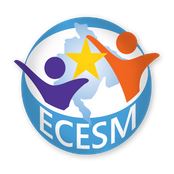
ECESM
Enhancement of cyber educational system of Montenegro
-

EAGLE
EAGLE (EnhAnced Government LEarning): A learning solution for public administration
-

SINC@HE
Support and Inclusion of students with disabilities at Higher Education Institutions in Montenegro
-
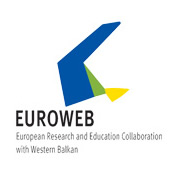
EUROWEB
European Research and Educational Collaboration with Western Balkans
-
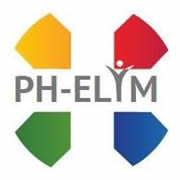
PH-ELYM
Public Health in Montenegro
-

HOMER
Harmonising Open data in the Mediterranean through better access and Reuse of public sector information
-
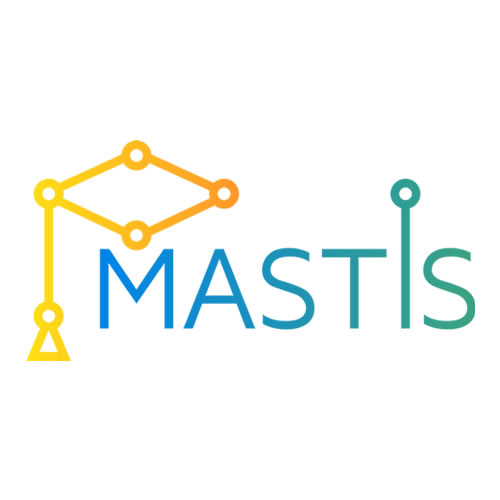
MASTIS
Establishing Modern Master-level Studies in Information Systems
-
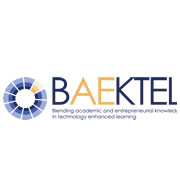
BEAKTEL
Blending academic and entrepreneurial knowledge in technology enhanced learning
-
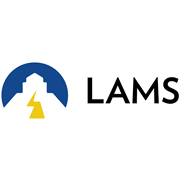
LAMS
Lightning Activity Monitoring SystemLightning Activity Monitoring System
-

ELEMEND
Electrical Energy Markets and Engineering Education
